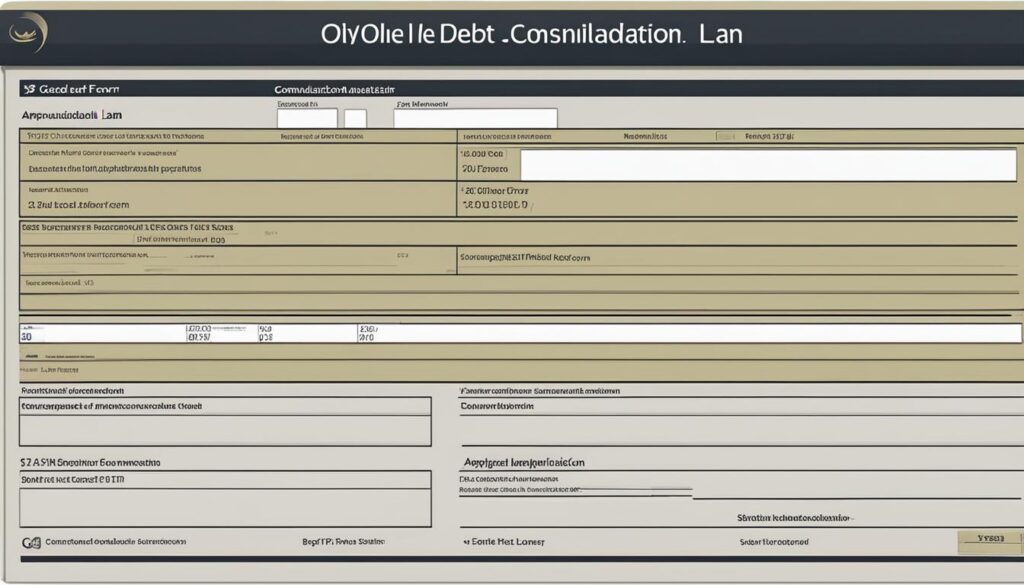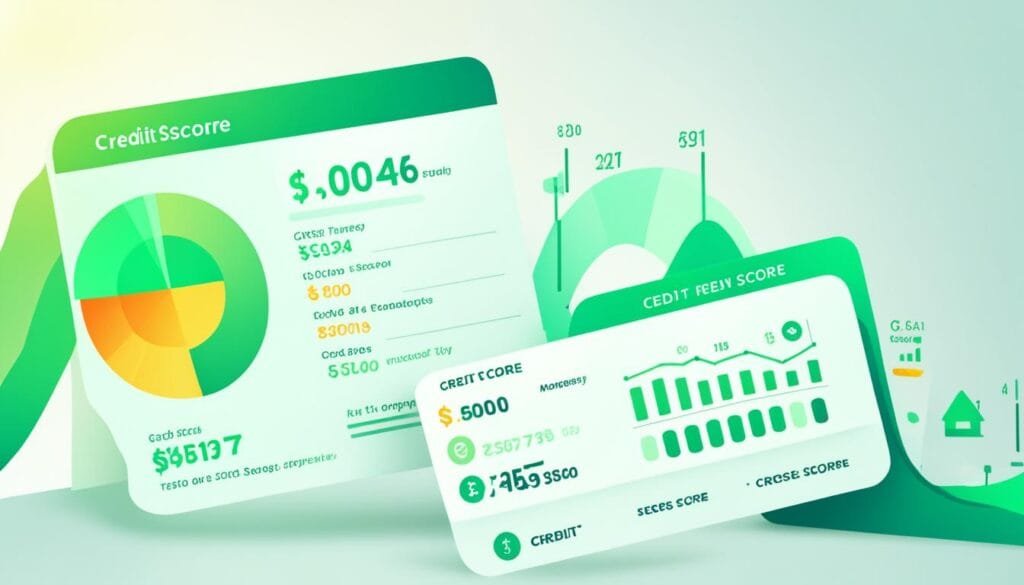Imagine this – you’re juggling multiple credit card bills, trying to keep track of different due dates and minimum payments. It’s stressful and overwhelming, to say the least. You find yourself drowning in debt and desperately searching for a way to simplify your finances.
That’s where debt consolidation loans come in. They offer a lifeline for individuals like yourself who are looking to take control of their debt and regain financial stability. Debt consolidation involves combining all your debts into a single loan, making it easier to manage and potentially reducing your interest rates.
As you embark on this journey to simplify your finances, it’s important to understand the various debt consolidation loan options available to you and evaluate their rates and terms. By doing so, you can make an informed decision that aligns with your financial goals.
Key Takeaways:
- Debt consolidation loans can help simplify your finances by combining multiple debts into one.
- By consolidating your debt, you may be able to secure a lower interest rate and have a single monthly payment.
- Debt consolidation loans offer the potential for faster debt repayment and simplified budgeting.
- It’s important to consider the benefits and drawbacks of debt consolidation before making a decision.
- Consulting with a financial advisor can provide personalized guidance in determining if debt consolidation is right for you.
Benefits of Debt Consolidation
Debt consolidation offers several benefits. One of the main advantages is faster debt repayment. Consolidating your debt into a single loan with a fixed monthly payment can help you pay off your debt more quickly. It can also simplify your finances by reducing multiple due dates and payment methods to just one.
Additionally, debt consolidation can often provide lower interest rates compared to credit cards, resulting in potential interest savings. By obtaining the best debt consolidation loans with low interest debt consolidation loans, you can reduce the overall amount you pay in interest and potentially save money in the long run.
Consolidating debt can also have a positive impact on your credit score over time. As you consistently make timely payments on your consolidated loan, it demonstrates responsible financial behavior to credit bureaus. This can help improve your credit score, making it easier to qualify for future loans and credit cards.
“Debt consolidation allows you to simplify your financial life and work toward a debt-free future with greater ease.” – [Financial Expert Name]
Streamlined Debt Repayment
With debt consolidation, you can say goodbye to keeping track of multiple payments with different due dates and amounts. By combining your debts into a single loan, you only need to make one monthly payment, making it easier to manage your finances.
Interest Savings
One of the key advantages of debt consolidation is the potential for lower interest rates. By securing the best debt consolidation loans with low interest rates, you can reduce the overall amount you pay in interest over time. This can result in significant savings, especially if you have high-interest credit card debt.
Improved Credit Score
Consolidating your debt and consistently making timely payments can positively impact your credit score. As you pay off your debt and demonstrate responsible financial behavior, your creditworthiness improves. This can open doors to better loan options and lower interest rates in the future.
Drawbacks of Debt Consolidation
Despite its benefits, debt consolidation also has some drawbacks that borrowers should consider. It is important to be aware of these potential downsides before proceeding with a debt consolidation loan application.
1. Up-Front Costs:
One potential drawback of debt consolidation is the possibility of incurring up-front costs, such as loan fees or closing costs. Before committing to a debt consolidation loan, it is crucial to carefully review the terms and fees associated with the loan. This will help you determine if the overall cost of consolidation is worth the potential benefits.
2. Interest Rates:
While debt consolidation loans can often provide lower interest rates, this is not always the case, especially if you have a lower credit score. The interest rate on the consolidation loan may not be lower than the rates on your existing debts, which could result in paying more interest over time. It is essential to compare the interest rates of the consolidation loan with your current debts to ensure it is a financially viable option.
3. Risk of Missed Payments:
Consolidating your debts into a single loan requires discipline and careful financial management. If you miss payments on your consolidation loan, you may incur late fees and penalties. Moreover, missed payments can have a negative impact on your credit score, making it difficult to obtain credit in the future. Before consolidating your debt, it is crucial to assess your ability to make the monthly payments consistently.
Understanding these potential drawbacks will help you make an informed decision about whether debt consolidation is the right option for you. Remember, debt consolidation loans with bad credit may come with higher interest rates, making it important to carefully evaluate the terms and conditions before proceeding.
How to Decide if Debt Consolidation is Right for You
Deciding whether debt consolidation is the right option for you depends on your individual circumstances. Here are some steps to help you make an informed decision:
- Check your credit score: Start by checking your credit score. Borrowers with good to excellent credit are more likely to qualify for low-interest debt consolidation loans, which can save you money in the long run.
- List your debts and payments: Make a comprehensive list of all your debts and their respective payments. This will give you a clear picture of your current financial situation and help you determine if consolidating your debts would be financially beneficial for you.
- Compare loan options: Research and compare loan options from online lenders, credit unions, and banks. Consider factors such as interest rates, repayment terms, and any additional fees or charges. Look for the best terms and rates that align with your financial goals.
- Gather necessary documents: Before applying for a debt consolidation loan, gather all the necessary documents such as pay stubs, bank statements, and proof of identification. Having these documents ready will streamline the application process.
- Be prepared for a hard credit pull: Keep in mind that applying for a debt consolidation loan may result in a hard credit inquiry, which can temporarily lower your credit score. Be prepared for this and factor it into your decision-making process.
- Consider additional factors: Take into account other important factors such as up-front costs, potential savings in interest rates, and your ability to afford the monthly payments. It’s essential to ensure that consolidating your debt is a sustainable solution for your financial situation.
By following these steps and considering the factors mentioned, you can evaluate whether debt consolidation is the right choice for you.

Can Debt Management Plans Include Debt Consolidation Loans?
Yes, debt management plans can include debt consolidation loans as a way of navigating debt management plans. Consolidating high-interest debts into a lower-interest loan can simplify repayment and save money in the long run. However, it’s important to carefully consider the terms and potential impact on credit before proceeding.
Conclusion
Debt consolidation loans can be a powerful tool for individuals seeking to simplify their finances and expedite the process of paying off their debts. By consolidating multiple debts into a single loan, borrowers have the potential to secure lower interest rates and establish a clear repayment schedule. However, it is crucial to carefully evaluate the advantages and disadvantages of debt consolidation and determine if it aligns with your financial goals and circumstances.
When considering debt consolidation, consulting with a financial advisor can provide invaluable personalized guidance, allowing you to make an informed decision. Be sure to thoroughly review the terms and costs associated with any loan before making a commitment to ensure you understand the implications. Additionally, borrowers should consider factors such as up-front costs, interest rates, and their ability to afford the monthly payments.
Ultimately, debt consolidation can help individuals regain control over their finances and streamline the repayment process. By consolidating debt, borrowers can eliminate the stress of managing multiple payments, potentially save on interest costs, and focus on achieving financial freedom. However, each person’s situation is unique, so it is important to assess your own circumstances and seek professional advice before embarking on a debt consolidation journey.
FAQ
What is debt consolidation?
Debt consolidation is the process of combining multiple loans into one, usually with the goal of securing a lower interest rate and simplifying your finances. It involves taking out a new loan to pay off existing debts, resulting in a single monthly payment.
How does debt consolidation benefit me?
Debt consolidation offers several benefits, including faster debt repayment, simplified budgeting, and potentially lower overall interest costs. By consolidating your debt into a single loan, you may be able to pay off your debt more quickly and save on interest payments.
Are there different types of debt consolidation loans?
Yes, there are various loan options available for debt consolidation. These include unsecured loans, which do not require collateral, and secured loans such as home equity lines of credit (HELOCs), which use your home as collateral.
Can I get a debt consolidation loan if I have bad credit?
While having bad credit may make it more challenging to obtain a debt consolidation loan, there are options available. Some lenders specialize in providing loans to individuals with bad credit. However, keep in mind that these loans may come with higher interest rates.
How do I decide if debt consolidation is the right option for me?
Deciding whether debt consolidation is right for you depends on your individual circumstances. Start by checking your credit score and listing your debts to determine if consolidating them would be financially beneficial. Compare loan options from different lenders, considering factors such as interest rates, monthly payments, and up-front costs.

